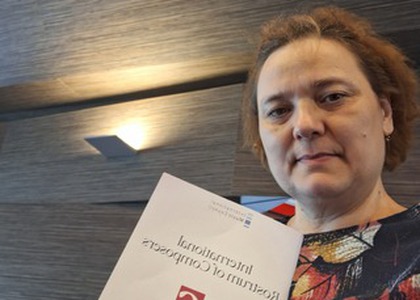> Interviews

Interview with Laura Ana Mânzat, Radio România Muzical representative at the International Rostrum of Composers
These days the International Rostrum of Composers took place in Ljubljana, Slovenia, and our colleague, Laura Ana Manzat, was present. She is on her way back to the country and gives us the details by phone.
Hello Laura!
Hello! Welcome back!
This week, between May 13th and 16th, there was a meeting fully subscribed to the main values of today's music, the International Rostrum of Composers, or International Rostrum of Composers, now in its 71st edition, hosted this time by the Slovenian Broadcasting, under the aegis of the International Music Council. It is, in fact, the most important platform for promoting contemporary music in the world today.
Over four days, delegates from the main radio stations in 23 countries, including Radio România Muzical, listened to and voted on the works of the best composers of the moment, entered in the competition in two categories - general and young composers under 30.
We listened to 42 creations, recordings from the last five years from various festivals, and two winning works were chosen, rewarded with cash grants, commissions from orchestras or chamber ensembles and broadcasters, as well as several other high scoring works which were also recommended to broadcasters.
We also had three works in the competition, a choral creation by Dan Dediu, from an inspirational area that touches springs of medieval-type sacredness, with the title O Magnum Mysterium, presented by the Radio Academic Choir conducted by Ciprian Țuțu, then Solomonarul by Diana Rotaru, an evocation of the ancient Romanian shaman riding a dragon and able to bring rain through incantations, actually a work for alto flute that was played by Ion Bogdan Ștefănescu; also, a string quartet entitled Prin Sunetele Florilor Albe (Through the Sounds of White Flowers), by Ulpiu Vlad, in a recording by the Arcadia Quartet.
Other interesting creations caught my attention, such as a work by a composer from Portugal, Mariana Dionisio, for vocal ensemble, which exploited the technical possibilities of the voices to the maximum, a violin concerto by a Hungarian composer, Balasz Kecskes, or a creation from France, La nuit obscure by Benoît Menut.
The winner, however, in the under-30 category was the work Calmness for clarinet and vibraphone by a young Czech composer, Darja Kukal Moiseeva, and in the general category a Latvian string trio work, The White Birds by Gundega Smite, won the vote.
This would be the balance of this true Eurovision of contemporary works, as the current International Rostrum of Composers in Ljubljana has been called.
How was Romanian music received from what you saw there?
I received really very good opinions, but with so many works and voting being absolutely secret and with an extremely complicated score, this was the result.
Laura, thank you for this intervention. Have a good journey home, how far or how close are you to home?
I'm in Hungary now, on the highway, thanks for the good wishes.
And we're waiting for you at home, because, right, listeners want you on our station.
Uh, yes. Yes. We also prepared an interview with a personality who was here. We'll air it next week.
So, you come bearing gifts, as they say.
Yes, I come bearing gifts, yes.
Translated by Bianca Daniela Penaru,
University of Bucharest, Faculty of Foreign Languages and Literatures, MTTLC, year II
Corrected by Silvia Petrescu














